Pittsburgh Chess League Round 2: natural moves are often bad
Oct 14, 2012 · 7 minute read · CommentschessPittsburghPittsburgh Chess League

Final position
Today I played in a round at the Pittsburgh Chess League for the first time in almost two years!
This was round 2 of the current season; I was fortunate that our team got a bye in round 1 last month, because that bye had made it possible for me to attend the Pittsburgh Recorder Society meeting instead.
Today’s lesson: “natural” looking moves in chess are often bad, and even fatal. My game contained a lot of “natural” moves by both myself and my opponent that were no good.
The complete annotated game
At your convenience, you can enjoy playing over the game with my annotations, including diagrams.
Preparation
You never know exactly whom you’ll play in the Pittsburgh Chess League team match, because although the schedules for the teams are set, it is usually not known until arrival which members of a team are actually going to play and represent the team. Individuals on a team can choose not to play, for whatever reason, and inform the team captain.
A couple of days before the team match, I had an idea of whom I might play, and I turned out to be right. It was a guy I’ve only played with once, when I was Black, and I had won. But since I was going to be White in the match, I had no idea what kind of Black openings he plays. Therefore, I went in just ready to play one of my usual White openings.
Strength
I knew I was considerably stronger than my opponent, who was on his rating floor of 1900.
Psychology
At the same time, I also knew that my opponent was very aggressive, and therefore, it was possible to get into trouble if I allowed him to get an attack of any kind. So I set a goal for myself of erring on the side of being more cautious and defensive than I ordinarily am. As my games in my recent Pittsburgh Chess Club tournament have shown, I have usually chosen to find the most committal, “best” move. That’s great if I can be confident of following up correctly. It’s not great if I make a mistake. The pragmatic question of how to synchronize my style of play with the realities of my opponent and the moment is one I have never answered perfectly.
Other factors
Also a serious issue for me going into this game was the fact that I was entering it in a physically and mentally less-energetic state than I would have liked. Yesterday I went on a tough 13-mile run with a friend in the morning, then went to a potluck/music jam in the evening, so I basically had no rest this weekend. I felt that I truly needed to conserve energy during the game, so that I would not run out in case the game lasted a long time.
Overview of my game
The opening
My opponent surprised me with the bizarre first move he played!!
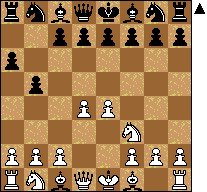
St. George Defense
Objectively, his opening, the infamous St. George Defense was bad, and I knew it, but I decided to play calmly and “normally”.
I was partly right, but also partly wrong.
Being calm is always good, but being overly cautious deprived me of playing stronger moves. I was clearly reacting to my having been too hotheaded in my tough game from just some days ago, in which I created a great position and then lost the thread.
Ignoring the obvious
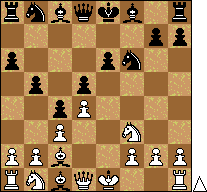
e5 outpost
We reached a position in which Black’s e5 square is obviously weak. If I had not been in my overly cautious, slow mode, I would have occupied it and secured a clear advantage immediately. Instead, I chose to just “naturally” “develop” my Queen Bishop and Knight, as though playing like a beginner who is told to “develop” pieces before starting any attack.
Playing too “naturally” is something a beginner does.
An expert is not supposed to just play “naturally”, but evaluate the position as it uniquely exists, and strike immediately if the context allows, or demands, immediate action. I wasn’t playing quite like an expert today, unfortunately.
In fact, in just a few moves, all my opening advantage had evaporated, as Black slowly deployed his pieces optimally:
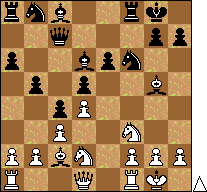
e5 OK for Black
The middle
When I realized that I had messed up the late opening, I tried to recover, by fighting for the e5 square afresh. My opponent returned my early favor by not playing the most critical fighting moves and instead also playing “naturally”, developing his final Bishop rather than beginning an attack on my King side that would have disrupted my late buildup and guaranteed equality. So I planted my Knight on e5:
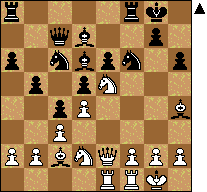
e5 taken
The game was basically over as soon as I occupied that outpost.
I’m not joking: White’s advantage is so large that if you gave me this position again, against anybody, I believe I could force a win. Black has no counterplay against White’s impending King side attack once e5 is occupied, especially given that Black also weakened g6 and h7.
The rest of the game was mostly anti-climactic, because Black is so lost. But there is one more observation to make.
The end
After Black played terribly and quickly lost the Exchange (a Rook for a Bishop) and was dead lost, this position arose:
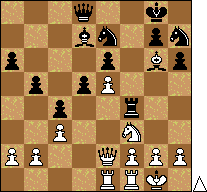
What to do with the attacked Bishop?
The “natural” move, Bb1, saving the Bishop and keeping it attacking Black along the diagonal, happens to be obvious and also best. But for once in the game, I didn’t play the “natural” move. I got sloppy. I played a “clever” move instead, g3, attacking Black’s remaining Rook.
That was stupid, and cost me some hard thinking I could have avoided, because Black just “naturally” sacrificed another Exchange in order to reach this bizarre position:
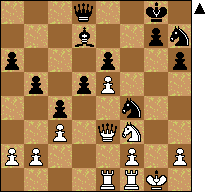
White is attacked
White is obviously totally winning, but at a price: Black has some kind of “attack” going on now whereas if the Bishop had retreated, Black would have had nothing. So I had to actually defend for a couple of moves to consolidate before finally beating back Black’s (admittedly futile) “attack” once and for all:
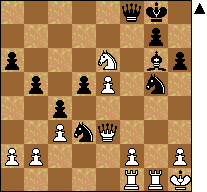
White smashes through
And the game finally ended:
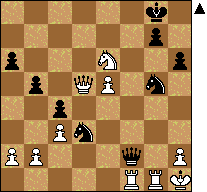
Black resigned
Lessons learned
I (re)learned some important lessons during this game:
- Sometimes the “natural” move is terrible.
- Sometimes the “natural” move is clearly best.
I am considering scrapping the whole concept of “natural” altogether from my mind. Chess is a discrete game with clear consequences and a tree of possible future game states. “Natural” is not good enough for a high level of play; it is a metaphor grounded in the continuous world. Even when I’m tired, I should not be thinking “natural” as an energy-saver. The question of how to gracefully degrade my play when trying to save energy, however, is difficult to answer, in this domain: I know how to run more slowly or do arithmetic sums more approximately or handwrite more sloppily, to save time or energy, but what is the best way to deliberately play chess less precisely at “less critical” moments and save the energy for “critical” moments?
What next?
I still haven’t lost a tournament game since returning to tournament play last month after an almost two-year absence. That’s good, of course, but on the flip side, I have been considerably higher-rated than most of my opponents. So my current record is nothing whatsoever to boast about. And, as I have shown in my annotations to my games, I have made various errors in some of my games that could have caused me real trouble if I had made those errors against stronger opponents.
Nevertheless, it’s been nice to be playing at least relatively decently. I expect to be playing next month in round 3 of the Pittsburgh Chess League matches.
Conclusion
I was happy to contribute a win to our team match (we ended up easily winning our match) in our first match in the Pittsburgh Chess League, but left my imperfect game with questions about how to keep my play sharp.